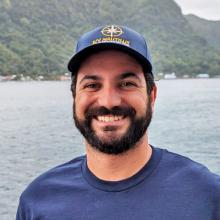
Luke McCartin
Tell us about your work/research. What kinds of things do you do?
I study the biogeography and evolution of deep-sea animals. I am interested in understanding the distribution of life in the deep sea, and how animals have evolved to inhabit certain depths and regions in the ocean. To do this, I pair observations from video surveys (using tools like Remotely Operated Vehicles) and historical collections with genetic analysis. This genetic analysis can involve either sequencing physical collections from museums or research expeditions or sequencing environmental DNA (eDNA) from water samples. The entire process, from collecting a sample to generating biodiversity information, involves time at sea, in the lab, and on my computer analyzing data. This diversity in my work keeps me busy and interested!
What sparked your initial interest in your career?
I’ve always been interested in understanding the biodiversity of our planet. I was fortunate to grow up in an ecologically fascinating place, Cape Cod in Massachusetts, USA. Here, I explored ponds, streams, marshes, beaches, and the open sea, and I learned about the species that inhabit these environments. I experienced how seasons changed the landscape from seemingly barren and cold in the winter to warm and full of life and migratory species in the summer.
Who influenced you or encouraged you the most?
There have been so many positive influences in my career, but I trace my initial interest in studying ecology and natural history to my father, who is a birdwatcher and herper. Peering through binoculars and turning over logs to find salamanders was the natural way of life growing up. I developed my interests into a career during my time as an undergraduate student and afterwards as a research assistant at the Woods Hole Oceanographic Institution. Here, scientists like Dr. Daniel Fornari and Dr. Timothy Shank opened my eyes to the possibility of a career studying the deep sea. At first, the deep sea seemed alien to me, but now feels just as familiar as the landscapes I grew up exploring.
What element of your work/study do you think is the most fascinating?
The most fascinating part of my work is exploring the unknown and finding new species, whether they are just new to me or potentially new to science. The unique thing about working in the deep sea is that we are frequently expanding our basic understanding of how species are distributed in big ways. We frequently find species in new regions of the world oceans or discovering new species altogether.
How did you get involved with the Ocean Exploration Trust?
I was invited to participate in this expedition by my dissertation committee member and mentor Dr. Annette Govindarajan at the Woods Hole Oceanographic Institution. My participation in this expedition is through a collaboration between her and my PhD advisor, Dr. Santiago Herrera, at Lehigh University.
What other jobs led you to your current career?
I’ve been working in scientific research labs in some capacity since I was eighteen years old, first as a volunteer, then as a research technician/assistant, and last as a PhD student. Along this journey, I've also worked as a tutor in math and science and in kitchens. While the latter seems unrelated, working on the line taught me the importance of hard work over long shifts and clear communication, skills that are vital for working with a team at sea.
What are your degrees and certifications?
I defended my dissertation in July, and have just completed my PhD. My bachelor's degree and PhD are in Biological Sciences, with coursework focusing on ecology, conservation biology, wildlife and fisheries biology, and of course oceanography and marine biology.
What are your hobbies?
Outside of work I enjoy fly fishing, hiking, and backpacking in wild places, from forested streams to vast expanses of sand dunes.
What advice would you give someone who wants to have a career like yours?
Pursue opportunities that help you gain transferable skills as a scientist. You might be surprised to find out that some people in the deep-sea field, like myself, ended up becoming deep-sea scientists after working on seemingly unrelated projects. For instance, before I started working in deep-sea biology, I worked in an entomology lab. While deep-sea biology and entomology may seem rather unrelated, as an entomologist I learned ecological and taxonomic principles and how to identify animals from field collections. Honing these skills was vital to my success as a research assistant and eventually as a PhD student working in deep-sea biology labs.
Expeditions
Luke participated in the following Ocean Exploration Trust expeditions:
